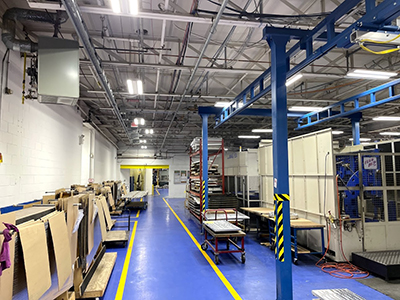
Digitalization, Demographics, Deglobalization Redefine Industrial Real Estate

Digitalization, demographics and deglobalization will drive the industrial market growth in the near future, said Newmark, New York.
“More industrial real estate will be needed to support forecasted double-digit annual growth in e-ecommerce sales,” Newmark said in a report, The Future of Industrial Real Estate: Trends for 2022 and Beyond. “Metros that realized the greatest adult population gains over the past five years have seen a corresponding boom in industrial development. Superregional distribution trends further impact this boom. [And] geopolitical security concerns and continued global supply chain volatility are driving greater domestic manufacturing expansion.”
Newmark noted industrial sector inventory modernization remains in an “early stage,” with more than 70 percent of U.S. industrial space built before the twenty-first century and one-third of the inventory more than 50 years old. The current construction pipeline totals 500 million square feet, nearly all set to deliver by 2023. “[This] signals a potential future supply gap if speculative construction starts remain muted in 2022 due to prolonged disruption,” the report said.
In light of recent supply chain disruptions, the report said more firms now seek to manage their supply chain to increase its resilience. Business logistics expenditures increased to 11 percent of total sales revenue last year on average, Newmark said. Nearly two-thirds of mid-size companies now strategically stockpile merchandise and the 10 largest national retailers have acquired more industrial space since 2020 than they did in the eight years prior to that.
The report said technology and automation will likely accelerate to solve challenging labor conditions and to meet corporate environmental, social and governance goals. The industry still struggles with labor shortages as warehousing and storage employment grew nearly 60 percent annually, but the warehouse automation market could grow 1.5-fold by 2025 to $37.6 billion, Newmark reported. “Fleet electrification, especially for last-mile delivery, has the potential to be most immediately deployable as firms accelerate green initiatives and distance from fossil fuels,” the report said.
Looking ahead, blockchain and cryptocurrency will likely become increasingly relevant to industrial real estate, Newmark said. “The United States is now the number-one global location for Bitcoin mining, driving increased demand for industrial space and land,” the report said, noting 27 of the 100 largest public companies already have a fully functioning, live service using blockchain technology.
